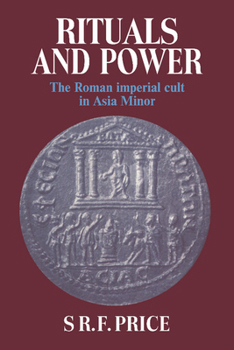Rituals and Power
Select Format
Select Condition 
Book Overview
In his study of the Greek cults of the Roman emperor in Asia minor, Simon Price attempts to discover why the Roman Emperor was treated like a god. He contends that ever since the emergence of... This description may be from another edition of this product.
Format:Paperback
Language:English
ISBN:052131268X
ISBN13:9780521312684
Release Date:December 1985
Publisher:Cambridge University Press
Length:320 Pages
Weight:0.95 lbs.
Dimensions:0.8" x 6.0" x 9.2"
Customer Reviews
4 ratings
The seminal work on the Roman imperial cult
Published by Thriftbooks.com User , 16 years ago
This book, the first major modern study of the practice of Roman emperor-worship, has since become the essential resource on the subject. Aside from collecting a wealth of evidence from the Eastern provinces, this work is also important because it is one of the first to openly recognize what Price calls the "Christianizing assumptions" that have colored studies of this kind in the past. Indeed, because of such assumptions the imperial cult had previously been largely neglected as an area of study, since it was seen as being a purely political, artificial construct rather than a "legitimate" religious practice. Without such anachronistic assumptions regarding what ancient religion "should" look like (often taking Christianity as the model of a "real" religion), the scholar is free to explore the phenomenon firmly within the context of the religious practices of the time. Price deals specifically with the provinces of Asia Minor. The primary reason is that is where the vast majority of physical evidence pertaining to the subject has been found. And because of the cultural history of the region, the phenomenon of Roman emperor-worship invites comparison to the ruler-worship of the Macedonian successor states, etc. As a result, the study deals primarily with the worship of the living emperor as practiced by the Greek-speaking population of the area and therefore has a lot to do with how the Greeks related to their Roman rulers. The five-star rating is not meant to imply that the work is flawless or incontestable in its specifics. Rather, it represents the fact that any study of the subject will have to take Price's work into account, and no serious student of Greco-Roman religion should be without it. That said, many of Price's conclusions seem much less radical now than they did twenty years ago. For an example of the next generation of Price's school of thought on the subject, see Ittai Gradel's Emperor Worship and Roman Religion (Oxford Classical Monographs).
a flawed classic
Published by Thriftbooks.com User , 17 years ago
Price's book was groundbreaking when written, establishing a standard approach to understanding the religion of the Roman imperial cult and its relation to the specific locale of the province of Asia and its environs. It is not the most clearly written book, however, and this can bog down a reader not committed to working to extract all the invaluable nuggets. If you're interested in the subject but maybe not willing to do all that work, try his summary article in the excellent collection edited by Richard Horsley, "Paul and Empire," which also contains several other scholars' one chapter summaries of book length research.
Best book on the subject
Published by Thriftbooks.com User , 22 years ago
If you want to learn about the Roman Imperial Cult, this is the book to read. Price has not simply compiled a great deal of evidence, but analyzed it with sophistication and imagination. Reading this book was one of the best experiences in my life as a scholar.
'Rituals and Power' present a puzzle...
Published by Thriftbooks.com User , 24 years ago
Why were the Emperors of Rome worshipped as gods in the eastern Mediterranean? S. R. F. Price addresses this question in his impressive work of scholarship 'Rituals and Power: the Roman imperial cult in Asia Minor'. Price's book first discusses the presence of the imperial cult in the Greek cities of the Empire, and the history of the cult's development. The imperial cult, which began with the deification of Julius Caesar and Augustus in the years of Augustus' reign, was to have a lasting impact on the role of the Emperor and on the way in which subject cities, particularly those of the Greek east, came to terms with their subjugation. Partly in response, cities deified the Emperor and, on occasion, members of his family, built temples and made statues and busts, all for the greater glory of Rome. The cult became as much a political as a religious phenomenon, another way to imbue civic benefits and patronage. The well-being of cities and their inhabitants became tied to the temples built and sacrifices made to the rulers of the Roman world. In the end, Dr. Price's goal of improving the 'understanding of the relationship of religious ritual and political power' is neatly achieved.Three centuries after Augustus was uncomfortable with the idea of being deified, his distant successor Diocletian used the mystery and pageantry of the cult to restore power to an Imperiacy which had been dangerously weakened by fifty years of near-anarchy. Yet within another fifty years, Constantine's purported conversion to Xianity would not only result in the abolition of the cult, but the ultimate weakening of the Emperor, this time in favour of the newly-hatched Bishops of the East and West.While not, perhaps, the most accessible book for a beginning student of ancient history, it will be of interest to anyone with a background in ancient history, or a curiosity about the later years of the Roman Empire, Roman religion and bureaucracy, and early Xianity. Dr. Price has written a very good and very thorough book, which will continue to be an important work in the study of this subject for many years to come.




